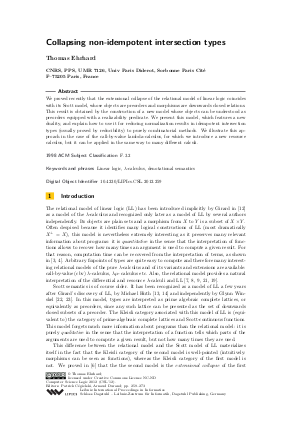Collapsing non-idempotent intersection types
Author Thomas Ehrhard
-
Part of:
Volume:
Computer Science Logic (CSL'12) - 26th International Workshop/21st Annual Conference of the EACSL (CSL 2012)
Part of: Series: Leibniz International Proceedings in Informatics (LIPIcs)
Part of: Conference: Computer Science Logic (CSL) - License:
 Creative Commons Attribution-NonCommercial-NoDerivs 3.0 Unported license
Creative Commons Attribution-NonCommercial-NoDerivs 3.0 Unported license
- Publication Date: 2012-09-03
File

PDF
LIPIcs.CSL.2012.259.pdf
- Filesize: 407 kB
- 15 pages
Document Identifiers
Subject Classification
Keywords
- Linear logic
- lambda-calculus
- denotational semantics
Metrics
- Access Statistics
-
Total Accesses (updated on a weekly basis)
0PDF Downloads0Metadata Views
Abstract
We proved recently that the extensional collapse of the relational model of linear logic coincides with its Scott model, whose objects are preorders and morphisms are downwards closed relations. This result is obtained by the construction of a new model whose objects can be understood as preorders equipped with a realizability predicate. We present this model, which features a new duality, and explain how to use it for reducing normalization results in idempotent intersection types (usually proved by reducibility) to purely combinatorial methods. We illustrate this approach in the case of the call-by-value lambda-calculus, for which we introduce a new resource calculus, but it can be applied in the same way to many different calculi.
Cite As Get BibTex
Thomas Ehrhard. Collapsing non-idempotent intersection types. In Computer Science Logic (CSL'12) - 26th International Workshop/21st Annual Conference of the EACSL. Leibniz International Proceedings in Informatics (LIPIcs), Volume 16, pp. 259-273, Schloss Dagstuhl – Leibniz-Zentrum für Informatik (2012)
https://doi.org/10.4230/LIPIcs.CSL.2012.259
BibTex
@InProceedings{ehrhard:LIPIcs.CSL.2012.259,
author = {Ehrhard, Thomas},
title = {{Collapsing non-idempotent intersection types}},
booktitle = {Computer Science Logic (CSL'12) - 26th International Workshop/21st Annual Conference of the EACSL},
pages = {259--273},
series = {Leibniz International Proceedings in Informatics (LIPIcs)},
ISBN = {978-3-939897-42-2},
ISSN = {1868-8969},
year = {2012},
volume = {16},
editor = {C\'{e}gielski, Patrick and Durand, Arnaud},
publisher = {Schloss Dagstuhl -- Leibniz-Zentrum f{\"u}r Informatik},
address = {Dagstuhl, Germany},
URL = {https://drops.dagstuhl.de/entities/document/10.4230/LIPIcs.CSL.2012.259},
URN = {urn:nbn:de:0030-drops-36776},
doi = {10.4230/LIPIcs.CSL.2012.259},
annote = {Keywords: Linear logic, lambda-calculus, denotational semantics}
}
